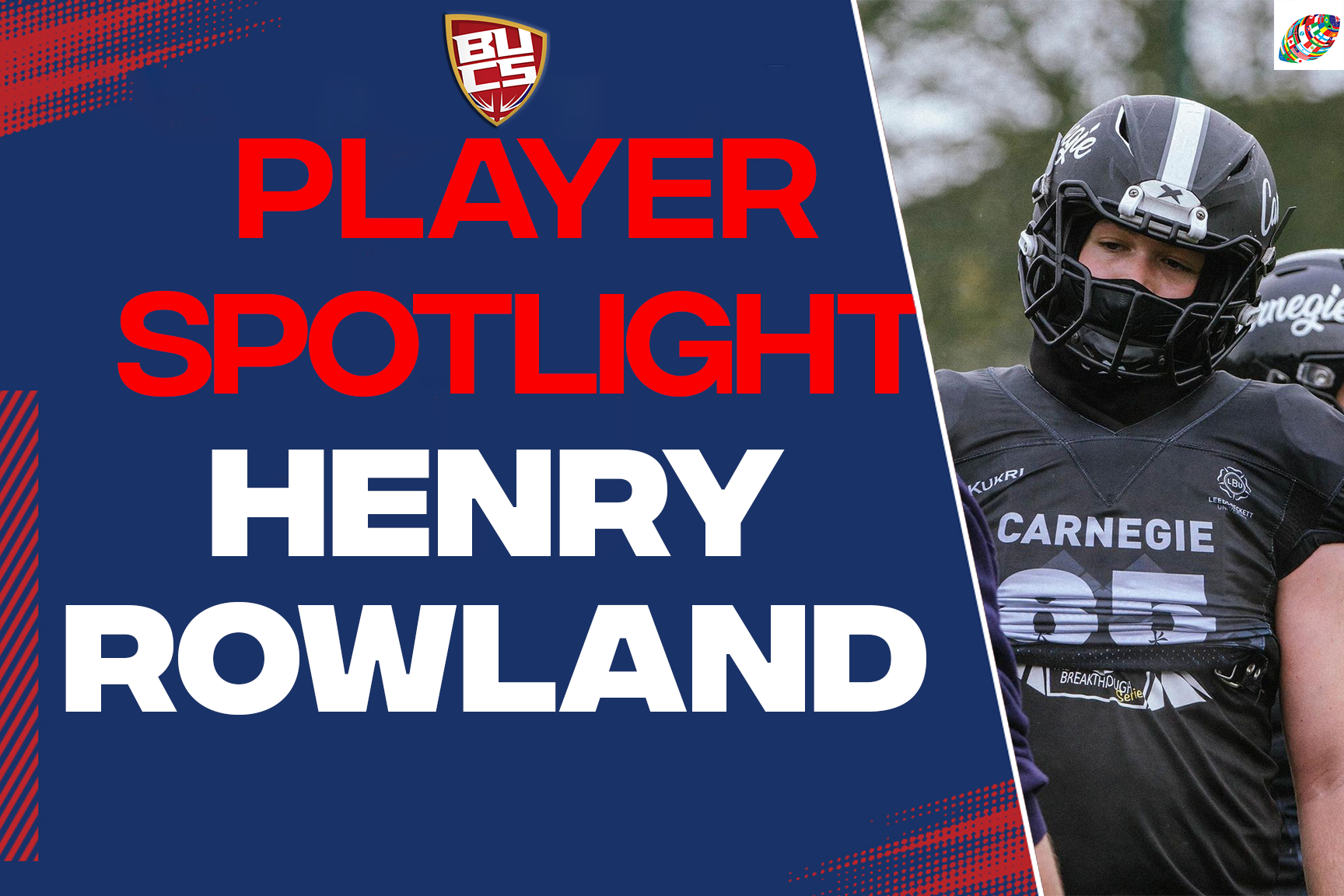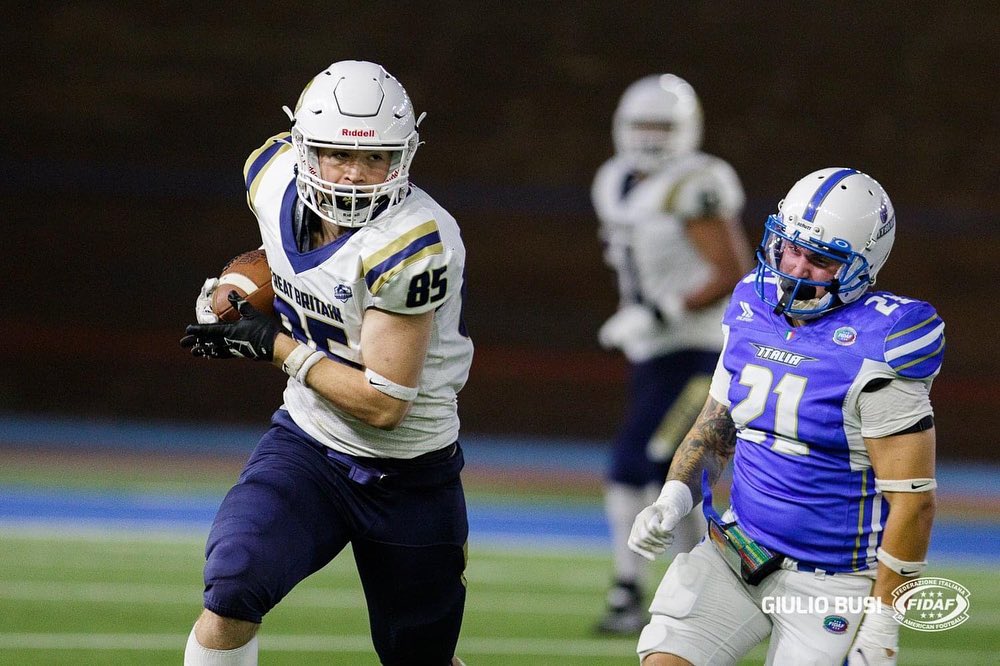BUCS Player Spotlight: How NFL Academy helped turn Leeds Beckett’s Henry Rowland into a CFL Prospect

Five years ago, Henry Rowland had not stepped foot on the gridiron and was completely new to the sport. Today, he sits amongst the best young tight ends in Europe, receiving interest from around the world.
The 22-year-old tight end began his career when he participated in NFL Academy’s first ever combine in 2019. At the time, his main incentive to attend the trial was to meet NFL star Odell Beckham Jr.
After being accepted to the Academy’s first ever squad, Rowland began to elevate his game massively. His season was cut short due to COVID-19, however, meaning he only spent a year practicing with the team.
Despite receiving multiple Division II NCAA scholarship offers, Rowland made the decision to remain in the UK and took his talents to Loughborough University where he would study for an undergraduate degree on top of blitzing through BUCS Division 1 and being crowned Division 1 Champions in a blowout over the Portsmouth Destroyers in March.
During his tenure at Loughborough, the 6’4, 240 pound pass catcher also spent time playing for the Tamworth Phoenix and London Warriors over recent summers, as well as earning himself an invitation to the CFL Global Combine.
Last year saw the young player make his first appearance for the Great Britain Lions, leading the team in receiving in his debut against Italy, bringing in four catches for 69 yards from his Tamworth teammate, quarterback Josh Allsebrook (Wisconsin Oshkosh, NCAA DIII). He repeated this feat in the national program’s win over France earlier this year, as well as making a key block in a pivotal rushing touchdown.

Rowland in his GB debut
Following an outstanding final year with Loughborough, where Rowland was a key component of the young offense, he made the decision to continue his education elsewhere, enrolling on a post-graduate degree at Leeds Beckett.
Leeds Beckett Carnegie have quickly risen to the upper echelon of BUCS Premier football, being one of few teams to invest heavily in external recruitment and imported players.
Carnegie had great success last year thanks to the likes of Oregon’s Matt Mariota (Yes, that Mariota) on top of several other international recruits to compliment their abundance of homegrown talent. Their 2022/23 campaign came to an end when UWE’s Hamish McClure found the endzone in the closing seconds of the intense semi-final battle.
Henry Rowland sat with us to speak about his playing experience and his future in football.
AFI: What can you tell us about your history in football and how it all began?
Rowland: I got into the sport like a lot of people internationally by watching highlights on YouTube. I’d always watch Adrian Peterson and Johnny Manziel highlights and then would throw a ball around a bit at school with my mates but it wasn’t until the NFL Academy came that I actually got involved in playing.
AFI: Are there any coaches or players that stood out to you in your football journey and why?
Rowland: The coaches at the academy were amazing. I owe a lot of my development to coach Ian Jacquet who was my receivers coach and also to the whole staff as a whole. Coach TA, Marv and Jerome Allen were big reasons I went to the Warriors this past summer as they had been so instrumental in my development at the academy. Outside of that I have to give a shout-out to my Lboro OC and LBU HC Joe Walker who’s been a great coach and also a great person off the field for me. Also at the national programme Jason Scott has been a great leader for us and Luke Carlton despite being a Titans coach is one of the best offensive minds I’ve worked with.
The players that have stood out the most to me have always been ones that are just complete outliers as talents. I was able to play alongside Seydou Traore (TE, Mississippi State) and Darren Agu (DE, Vanderbilt) at the academy who are tearing it up at power 5 teams and then also I was at Loughborough with Dayo who’s now on the Texans. Even at Beckett I’ve been lucky enough to play with Dawson Downing who played for 4 years at Mizzou and it’s been really good to just see the level those guys operate at and how they go about stuff.
AFI: What was your experience like at NFL Academy and what impact did it have on you as a player and a person?
Rowland: The academy experience was amazing. It took me from a kid who’d never really played football to coming out the other side 6 months later as a far more polished player. It was an intense programme and it was very competitive but it’s an environment I really miss to be honest.
AFI: How did you find your first taste of Uniball with Loughborough?
Rowland: My first taste of uniball at Loughborough was really interesting, it was very different to what I was used to at the academy and it forced me to step up as a leader. It’s a very different experience to the academy there’s a lot more people fresh to the sport and a less time to teach them everything so it was a different challenge. The speed felt a little slower but it was great to be playing live games after not being able too during Covid.
AFI: What was the process that brought you to transfer from Loughborough to Leeds Beckett and what was attractive to you about Carnegie’s setup?
Rowland: I’d finished my undergrad and was looking to do a masters somewhere and when coach Walker got the head coaching job there it made a lot of sense for me to enroll there and keep working in his system because I was so familiar with it and we’d developed a really good understanding. The setup was great and they clearly value the sport a great deal. Also having the opportunity to play alongside American talent was a big attraction as it can only make me better.
AFI: Having played at so many different levels, what are the main differences you notice at each level?
Rowland: I think in terms of intensity and speed the academy was the highest level I’d practiced at. The main difference I’ve found between university football and adult football is that you usually get better athletes with more speed at university but the physicality and intensity isn’t as high as in adult ball where you have fully developed man playing at most positions. For me it’s been key to adapt my game to the level I’m at so if I’m playing university football it’s more about using my size and strength against smaller players whereas at adult level I find it easier to create separation and win through speed and athleticism.
AFI: Can you talk about your experience at the CFL Global combine and what you gained from it?
Rowland: The experience at the CFL combine was amazing. It was great to see other great athletes from the country and understand the benchmarks in physical testing for that level. I think physical testing didn’t necessarily stand out the way I’d wanted too but I liked that there were 1 on 1’s and position specific drills which I feel balanced that out. I was happy with how I did in the 1 on 1 ‘s especially winning reps against Emmanuel Falola and Maceo Beard which helped me believe I can compete at that level.
AFI: What has been your proudest or most defining moment of your career so far?
Rowland: For me the proudest moments I’ve had have come from representing my country. Leading the team in receiving vs the European champions at the time in Italy meant a lot to me, I hadn’t even been sure I’d make the squad for that game going in so to have been able to play the way I did was a really proud moment. But probably the proudest moment I’ve had came from a block I made for Aaron Sekwalor to run in and win the game in overtime against France because of it being in front of the home crowd and also because my blocking is something I’ve put a lot of work into since I started playing so to be able to make a big play in that part of my game meant a lot.
AFI: What is your goal in football over the next few years?
Rowland: My goals for the next few years are to play a season in Europe, hopefully push for more opportunities in Canada too and then continue to represent GB as we go and play some of the biggest teams in Europe. Short term I’m looking to leave a mark at Leeds Beckett and go deep into the playoffs to close out my university career.
AFI: Finally, how would you describe your play style? Is there someone you look up to?
Rowland: My play style is more that of a flex than a true in-line Y. I look up to players like Kyle Pitts, Evan Engram and Travis Kelce who utilize their combination of size, speed and route running to create matchup problems against either smaller corners or slower backers.